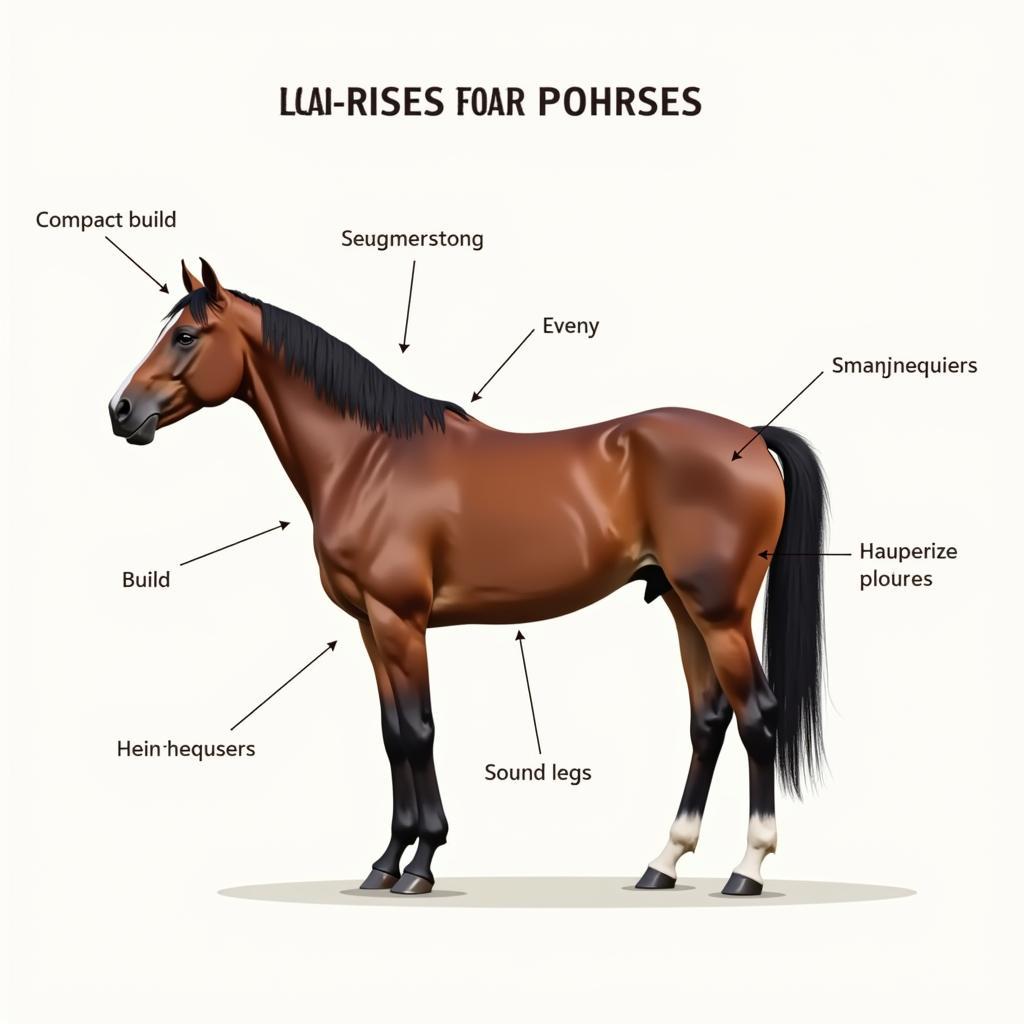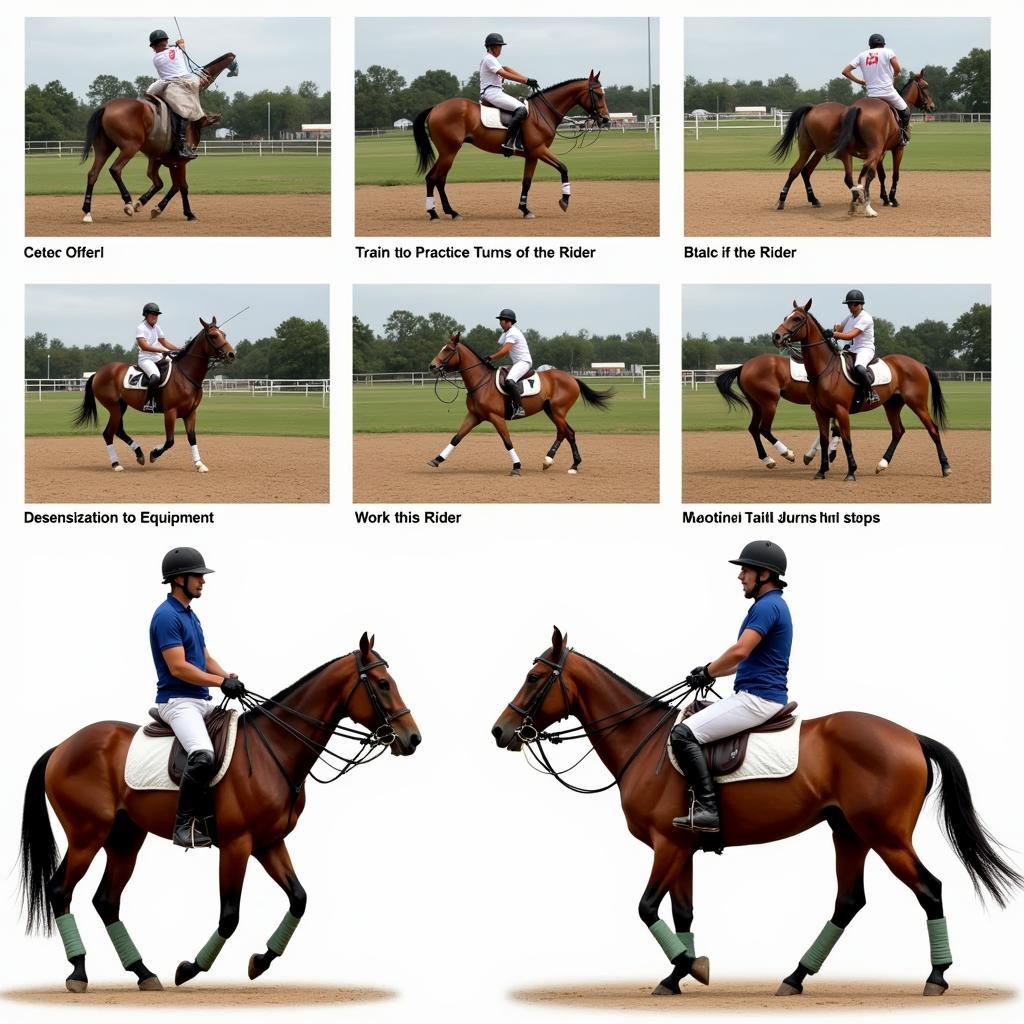Polo, the “Sport of Kings,” demands a unique combination of athleticism, intelligence, and temperament from its equine participants. Not just any horse can thrive amidst the fast-paced action and strategic maneuvers of this exhilarating sport. Selecting the right horse for polo and providing it with specialized training is paramount to success on the field. This comprehensive guide delves into the world of Horses For Polo, equipping you with the knowledge to make informed decisions and unlock your equine partner’s full potential.
Understanding the Polo Pony: Breed, Conformation, and Temperament
While often referred to as “ponies,” polo horses are full-sized horses chosen for their agility, speed, and responsiveness. While Thoroughbreds are the most popular breed for polo, their stamina and athleticism making them ideal for the demands of the game, Quarter Horses and crosses of these breeds are also frequently found on the polo field. When evaluating a horse for polo, certain conformation traits are highly desirable:
- Height: Ideally between 15 and 16 hands high, offering a balance of maneuverability and power.
- Build: A compact, muscular build with strong hindquarters for powerful acceleration and quick turns.
- Neck: A long, well-set neck allows for flexibility and responsiveness to rider cues.
- Legs: Sound, well-conformed legs with strong tendons and joints are crucial to withstand the rigors of the game.
Beyond physical attributes, temperament plays a vital role in a polo horse’s success. The ideal polo horse possesses:
- Intelligence: A quick mind to learn and execute complex plays.
- Courage: Fearlessness in the face of fast-approaching horses and swinging mallets.
- Responsiveness: Sensitivity to rider cues and a willingness to work in partnership.
- Stamina: The endurance to maintain speed and agility throughout the match.
 Polo Horse Conformation
Polo Horse Conformation
Training the Polo Prospect: From Novice to Seasoned Competitor
Training a polo horse is a gradual process that requires patience, skill, and a deep understanding of equine behavior. Here’s an overview of the key stages:
- Foundation: Before stepping onto the polo field, a young horse must have a solid foundation in basic riding skills. This includes responding to rein aids, leg pressure, and voice commands, as well as being comfortable with a rider on its back.
- Desensitization: Polo horses must remain calm amidst the chaos of the game. This involves gradually introducing them to the sights and sounds of the polo field, such as swinging mallets, the sound of the ball being struck, and other horses approaching at speed.
- Polo-Specific Training: Once a horse is comfortable with the basics, specialized training begins. This includes teaching the horse to:
- Neck-reining: Responding to subtle rein pressure on the neck, allowing the rider greater freedom to use the mallet.
- Stops and Turns: Executing quick, precise stops and turns, essential for maneuvering on the field.
- Speed Control: Maintaining a steady gait and accelerating quickly when needed.
- Bumping: Learning to use its body to bump other horses out of the way, a key tactic in polo.
 Polo Horse Training Exercises
Polo Horse Training Exercises
- Playing Chukkars: Short, timed periods of play called “chukkars” are gradually introduced, allowing the horse to acclimate to the speed and strategy of the game.
- Advanced Training: As the horse progresses, more advanced skills are introduced, such as:
- Ride-offs: A maneuver where horses ride alongside each other, attempting to push the opponent off the line of the ball.
- Hooking: Using the mallet to block an opponent’s shot.
- Anticipation: Learning to anticipate the flow of the game and react accordingly.
Choosing the Right Polo Horse: Finding Your Perfect Match
Selecting a horse for polo is a highly personal decision. Here are key factors to consider:
- Experience Level: Beginners benefit from a seasoned polo pony that understands the game. More experienced players may opt for a greener horse to train to their own style.
- Playing Style: Different horses excel in different positions. Some are naturally fast and agile, while others are strong and powerful, suited for blocking or ride-offs.
- Budget: Polo horses can range in price from a few thousand dollars to hundreds of thousands, depending on their breeding, training, and competition experience.
It’s essential to work with a reputable trainer or experienced polo player who can help you find a horse that suits your skill level, playing style, and budget.
Caring for Your Polo Athlete: Ensuring Peak Performance
Proper care is essential for keeping your polo horse healthy, happy, and performing at its best. This includes:
- Nutrition: A balanced diet of high-quality hay, grain, and supplements tailored to the horse’s workload.
- Veterinary Care: Regular veterinary check-ups, vaccinations, and dental care.
- Farrier Care: Regular hoof trimming and shoeing are crucial for maintaining soundness.
- Rest and Recovery: Adequate rest and recovery time between matches and training sessions to prevent injuries and burnout.
FAQ: Commonly Asked Questions About Horses for Polo
1. How long does it take to train a horse for polo?
The time it takes to train a horse for polo varies depending on the horse’s age, temperament, and previous training. On average, it can take two to three years to develop a horse into a competent polo pony.
2. Are polo ponies mistreated?
Polo organizations have strict rules in place to protect the welfare of the horses. Responsible players and trainers prioritize their horses’ well-being, providing excellent care and ensuring they are treated humanely.
3. What makes a good polo horse?
A good polo horse possesses a unique combination of athleticism, intelligence, courage, and responsiveness. They should be quick learners, fearless in the face of fast-paced action, and sensitive to rider cues.
4. Can any horse be trained for polo?
While certain breeds are more commonly used in polo, any horse with the right temperament, athleticism, and conformation can be trained for the sport.
5. What is a chukka?
A chukka is a period of play in a polo match. Each chukka lasts 7 minutes, and a standard polo match consists of four to six chukkas.
Finding Your Champion
Choosing and training a horse for polo is a rewarding journey. By understanding the breed characteristics, training process, and care requirements, you can find your perfect equine partner and experience the thrill of this exhilarating sport.
If you’re ready to embark on your polo adventure, remember that Justus Horses USA is here to support you every step of the way. Contact us today to discuss your polo aspirations. We offer a curated selection of polo horses, expert training programs, and valuable resources to guide you on your journey to becoming a successful polo player.
Need Assistance?
Call: 0772127271
Email: [email protected]
Visit Us: QGM2+WX2, Vị Trung, Vị Thuỷ, Hậu Giang, Việt Nam.
Our dedicated customer care team is available 24/7 to answer your questions and provide personalized support.